Management Accounting: Then vs Now and Evolving Skills for Success
VerifiedAdded on 2023/06/10
|13
|3757
|150
Essay
AI Summary
This essay provides a comprehensive overview of the evolving roles of management accountants over the past 10 years, highlighting the shift from traditional reporting obligations to more strategic and analytical functions. It discusses the impact of technological advancements and external/internal factors driving these changes. The essay also identifies and elaborates on five crucial skills for modern management accountants: strategic thinking, analytical abilities, business acumen, management abilities, and relevant knowledge in operations and management accounting. For each skill, the essay explains its importance and how it has changed over the past decade, emphasizing the increasing need for accountants to be forward-thinking, analytical, and business-oriented to contribute effectively to organizational success. The comparison is made in the form of ‘then versus now’. The essay concludes by emphasizing the importance of continuous development and adaptation for management accountants to remain relevant and valuable in the ever-changing business environment. Desklib offers more resources for students.
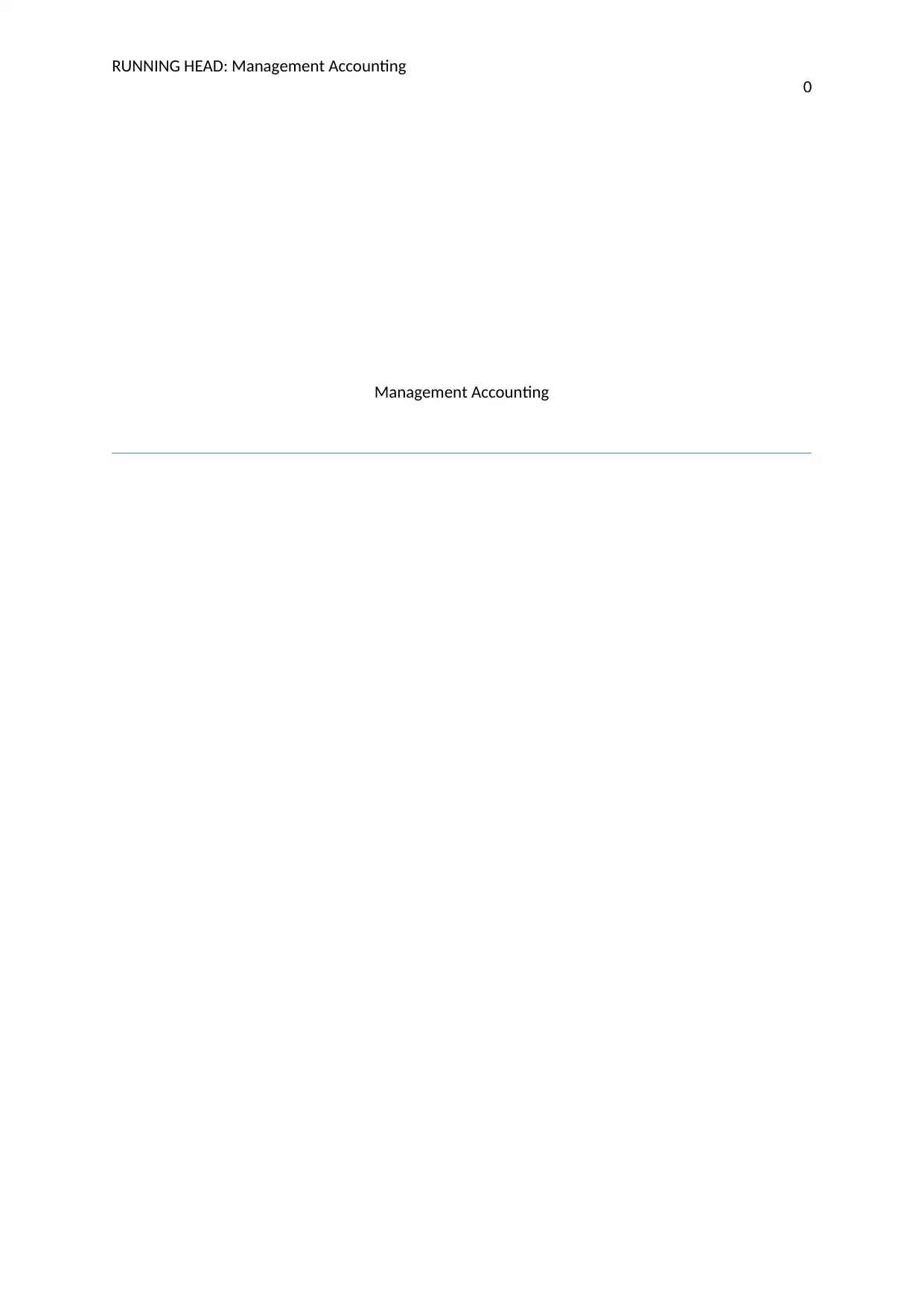
RUNNING HEAD: Management Accounting
0
Management Accounting
0
Management Accounting
Paraphrase This Document
Need a fresh take? Get an instant paraphrase of this document with our AI Paraphraser
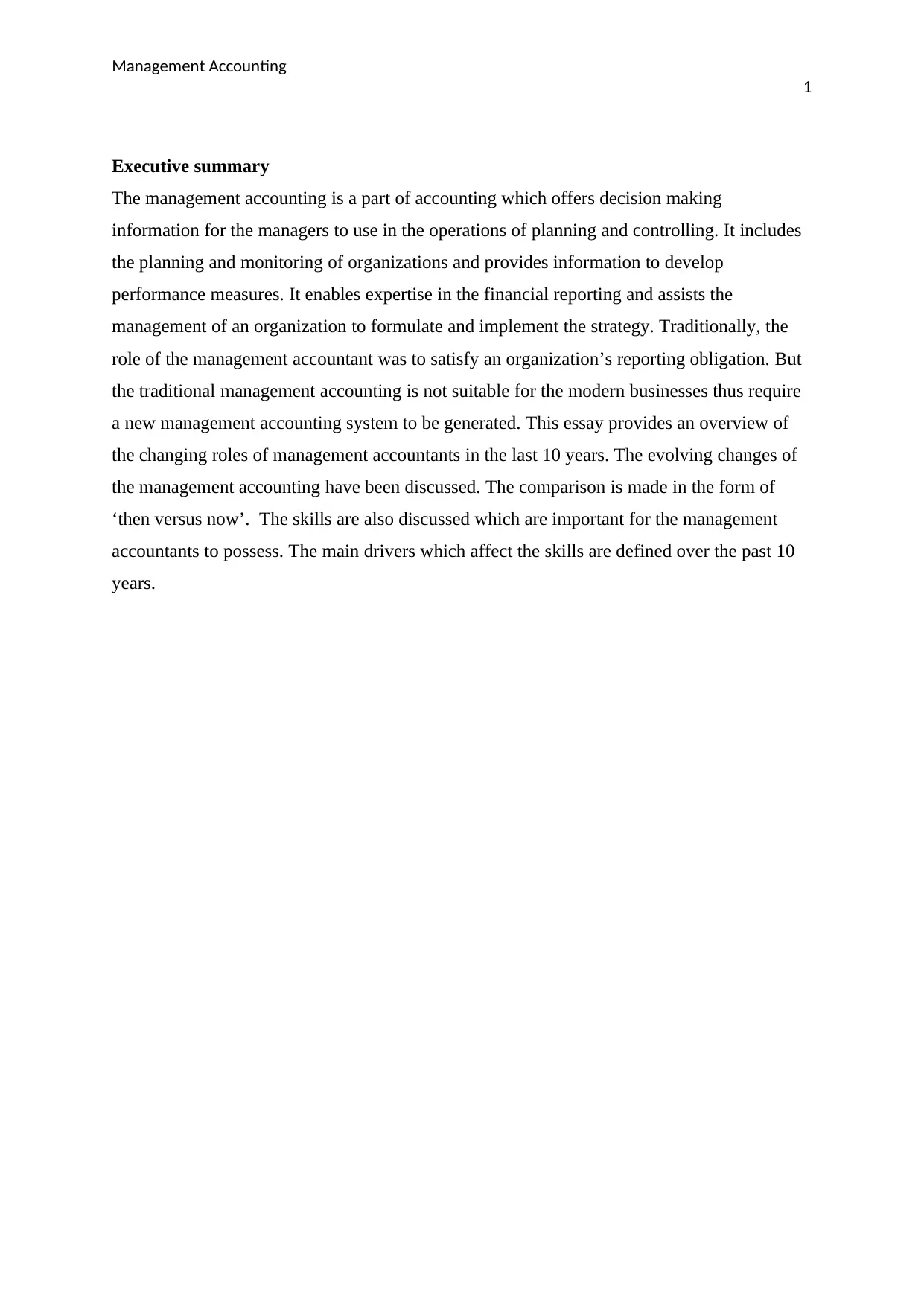
Management Accounting
1
Executive summary
The management accounting is a part of accounting which offers decision making
information for the managers to use in the operations of planning and controlling. It includes
the planning and monitoring of organizations and provides information to develop
performance measures. It enables expertise in the financial reporting and assists the
management of an organization to formulate and implement the strategy. Traditionally, the
role of the management accountant was to satisfy an organization’s reporting obligation. But
the traditional management accounting is not suitable for the modern businesses thus require
a new management accounting system to be generated. This essay provides an overview of
the changing roles of management accountants in the last 10 years. The evolving changes of
the management accounting have been discussed. The comparison is made in the form of
‘then versus now’. The skills are also discussed which are important for the management
accountants to possess. The main drivers which affect the skills are defined over the past 10
years.
1
Executive summary
The management accounting is a part of accounting which offers decision making
information for the managers to use in the operations of planning and controlling. It includes
the planning and monitoring of organizations and provides information to develop
performance measures. It enables expertise in the financial reporting and assists the
management of an organization to formulate and implement the strategy. Traditionally, the
role of the management accountant was to satisfy an organization’s reporting obligation. But
the traditional management accounting is not suitable for the modern businesses thus require
a new management accounting system to be generated. This essay provides an overview of
the changing roles of management accountants in the last 10 years. The evolving changes of
the management accounting have been discussed. The comparison is made in the form of
‘then versus now’. The skills are also discussed which are important for the management
accountants to possess. The main drivers which affect the skills are defined over the past 10
years.
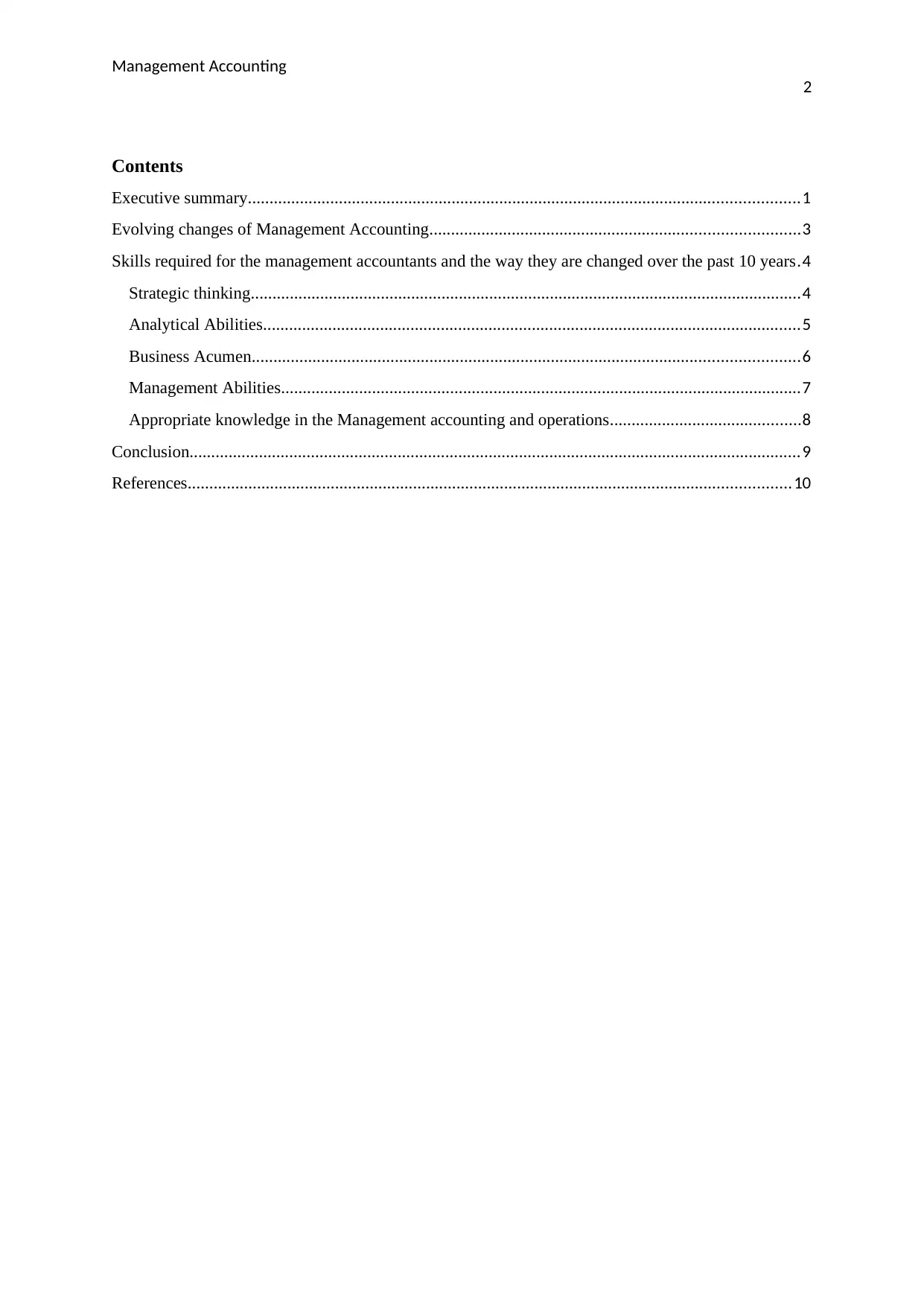
Management Accounting
2
Contents
Executive summary...............................................................................................................................1
Evolving changes of Management Accounting.....................................................................................3
Skills required for the management accountants and the way they are changed over the past 10 years.4
Strategic thinking...............................................................................................................................4
Analytical Abilities............................................................................................................................5
Business Acumen..............................................................................................................................6
Management Abilities........................................................................................................................7
Appropriate knowledge in the Management accounting and operations............................................8
Conclusion.............................................................................................................................................9
References...........................................................................................................................................10
2
Contents
Executive summary...............................................................................................................................1
Evolving changes of Management Accounting.....................................................................................3
Skills required for the management accountants and the way they are changed over the past 10 years.4
Strategic thinking...............................................................................................................................4
Analytical Abilities............................................................................................................................5
Business Acumen..............................................................................................................................6
Management Abilities........................................................................................................................7
Appropriate knowledge in the Management accounting and operations............................................8
Conclusion.............................................................................................................................................9
References...........................................................................................................................................10
⊘ This is a preview!⊘
Do you want full access?
Subscribe today to unlock all pages.

Trusted by 1+ million students worldwide
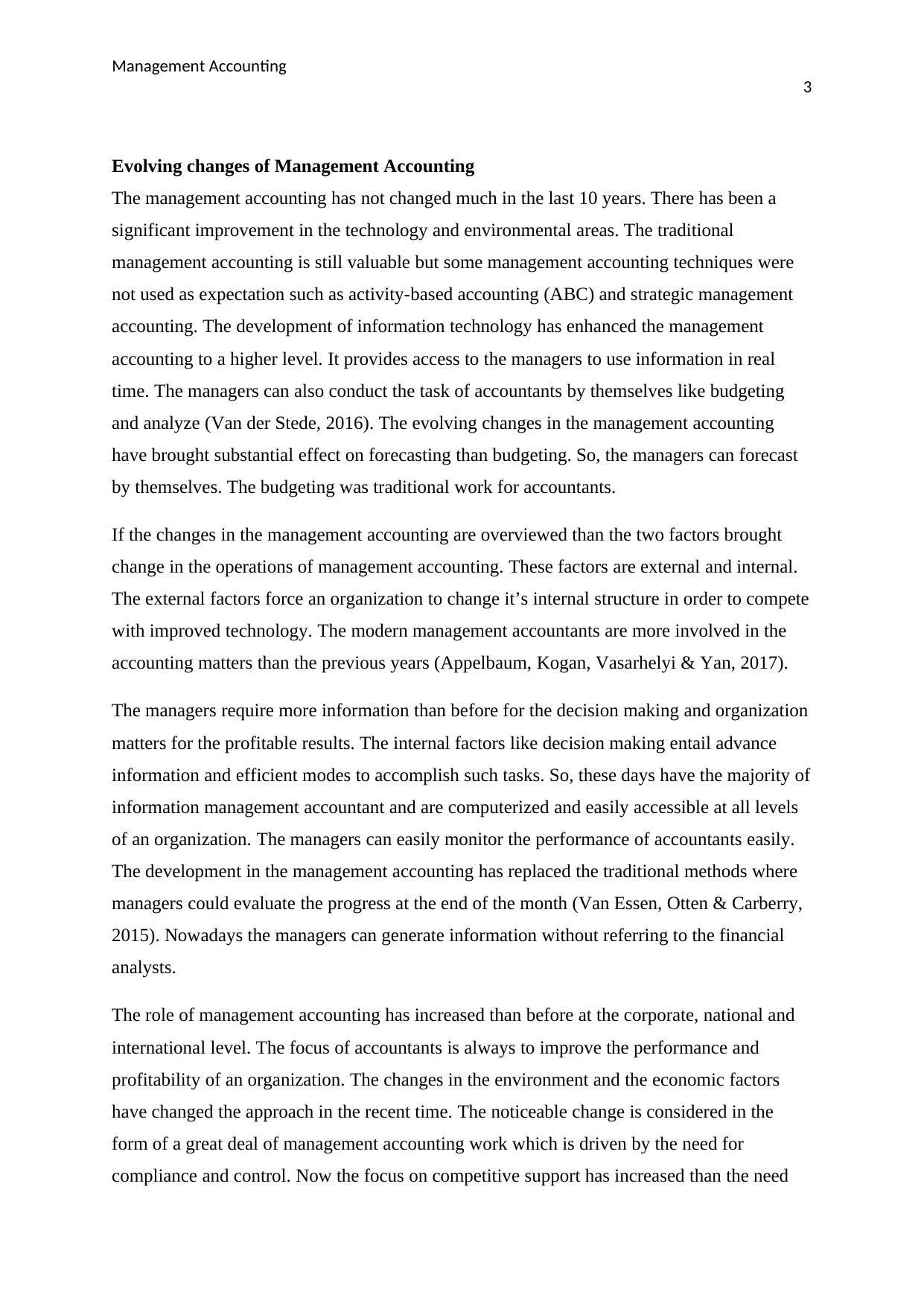
Management Accounting
3
Evolving changes of Management Accounting
The management accounting has not changed much in the last 10 years. There has been a
significant improvement in the technology and environmental areas. The traditional
management accounting is still valuable but some management accounting techniques were
not used as expectation such as activity-based accounting (ABC) and strategic management
accounting. The development of information technology has enhanced the management
accounting to a higher level. It provides access to the managers to use information in real
time. The managers can also conduct the task of accountants by themselves like budgeting
and analyze (Van der Stede, 2016). The evolving changes in the management accounting
have brought substantial effect on forecasting than budgeting. So, the managers can forecast
by themselves. The budgeting was traditional work for accountants.
If the changes in the management accounting are overviewed than the two factors brought
change in the operations of management accounting. These factors are external and internal.
The external factors force an organization to change it’s internal structure in order to compete
with improved technology. The modern management accountants are more involved in the
accounting matters than the previous years (Appelbaum, Kogan, Vasarhelyi & Yan, 2017).
The managers require more information than before for the decision making and organization
matters for the profitable results. The internal factors like decision making entail advance
information and efficient modes to accomplish such tasks. So, these days have the majority of
information management accountant and are computerized and easily accessible at all levels
of an organization. The managers can easily monitor the performance of accountants easily.
The development in the management accounting has replaced the traditional methods where
managers could evaluate the progress at the end of the month (Van Essen, Otten & Carberry,
2015). Nowadays the managers can generate information without referring to the financial
analysts.
The role of management accounting has increased than before at the corporate, national and
international level. The focus of accountants is always to improve the performance and
profitability of an organization. The changes in the environment and the economic factors
have changed the approach in the recent time. The noticeable change is considered in the
form of a great deal of management accounting work which is driven by the need for
compliance and control. Now the focus on competitive support has increased than the need
3
Evolving changes of Management Accounting
The management accounting has not changed much in the last 10 years. There has been a
significant improvement in the technology and environmental areas. The traditional
management accounting is still valuable but some management accounting techniques were
not used as expectation such as activity-based accounting (ABC) and strategic management
accounting. The development of information technology has enhanced the management
accounting to a higher level. It provides access to the managers to use information in real
time. The managers can also conduct the task of accountants by themselves like budgeting
and analyze (Van der Stede, 2016). The evolving changes in the management accounting
have brought substantial effect on forecasting than budgeting. So, the managers can forecast
by themselves. The budgeting was traditional work for accountants.
If the changes in the management accounting are overviewed than the two factors brought
change in the operations of management accounting. These factors are external and internal.
The external factors force an organization to change it’s internal structure in order to compete
with improved technology. The modern management accountants are more involved in the
accounting matters than the previous years (Appelbaum, Kogan, Vasarhelyi & Yan, 2017).
The managers require more information than before for the decision making and organization
matters for the profitable results. The internal factors like decision making entail advance
information and efficient modes to accomplish such tasks. So, these days have the majority of
information management accountant and are computerized and easily accessible at all levels
of an organization. The managers can easily monitor the performance of accountants easily.
The development in the management accounting has replaced the traditional methods where
managers could evaluate the progress at the end of the month (Van Essen, Otten & Carberry,
2015). Nowadays the managers can generate information without referring to the financial
analysts.
The role of management accounting has increased than before at the corporate, national and
international level. The focus of accountants is always to improve the performance and
profitability of an organization. The changes in the environment and the economic factors
have changed the approach in the recent time. The noticeable change is considered in the
form of a great deal of management accounting work which is driven by the need for
compliance and control. Now the focus on competitive support has increased than the need
Paraphrase This Document
Need a fresh take? Get an instant paraphrase of this document with our AI Paraphraser
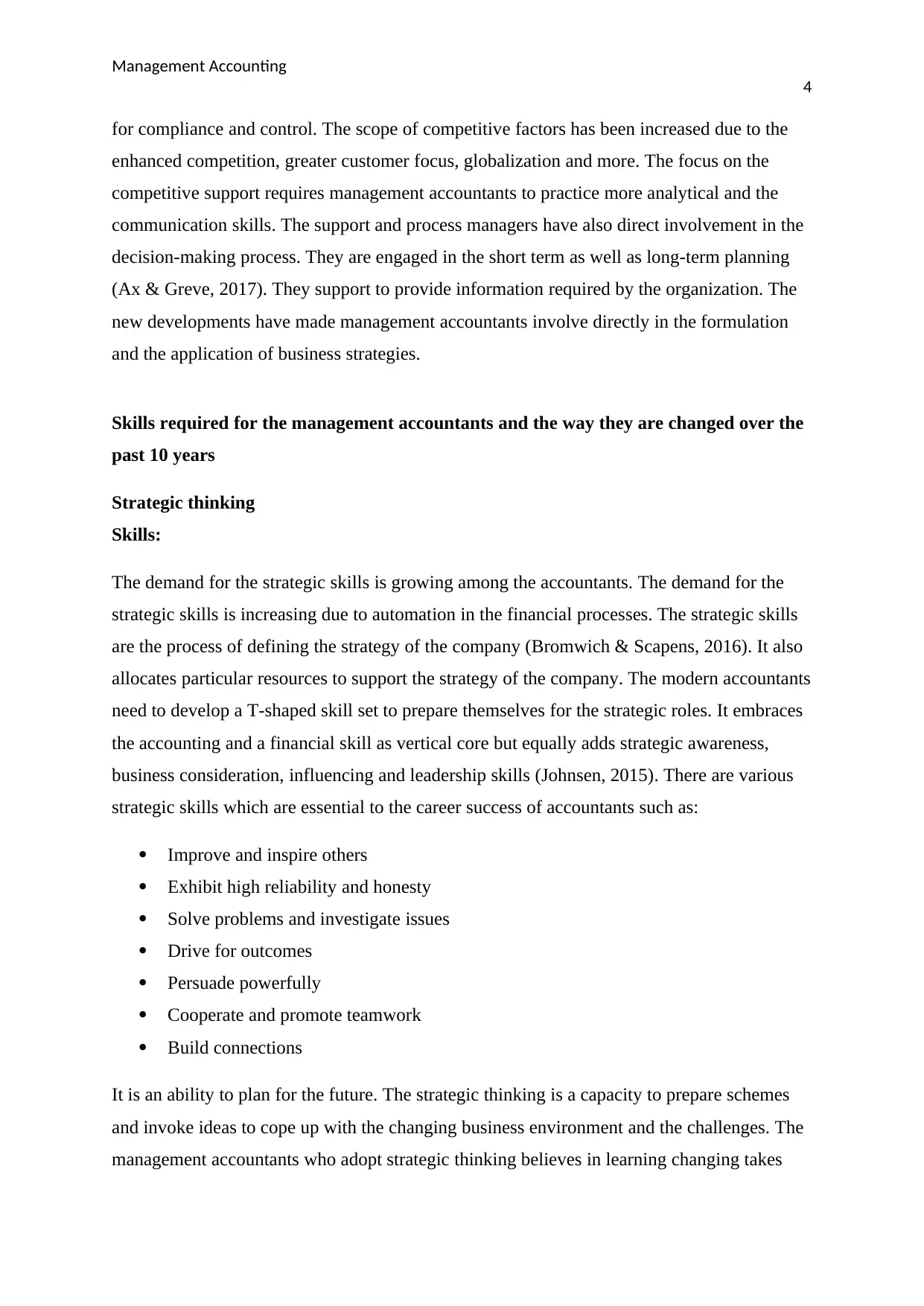
Management Accounting
4
for compliance and control. The scope of competitive factors has been increased due to the
enhanced competition, greater customer focus, globalization and more. The focus on the
competitive support requires management accountants to practice more analytical and the
communication skills. The support and process managers have also direct involvement in the
decision-making process. They are engaged in the short term as well as long-term planning
(Ax & Greve, 2017). They support to provide information required by the organization. The
new developments have made management accountants involve directly in the formulation
and the application of business strategies.
Skills required for the management accountants and the way they are changed over the
past 10 years
Strategic thinking
Skills:
The demand for the strategic skills is growing among the accountants. The demand for the
strategic skills is increasing due to automation in the financial processes. The strategic skills
are the process of defining the strategy of the company (Bromwich & Scapens, 2016). It also
allocates particular resources to support the strategy of the company. The modern accountants
need to develop a T-shaped skill set to prepare themselves for the strategic roles. It embraces
the accounting and a financial skill as vertical core but equally adds strategic awareness,
business consideration, influencing and leadership skills (Johnsen, 2015). There are various
strategic skills which are essential to the career success of accountants such as:
Improve and inspire others
Exhibit high reliability and honesty
Solve problems and investigate issues
Drive for outcomes
Persuade powerfully
Cooperate and promote teamwork
Build connections
It is an ability to plan for the future. The strategic thinking is a capacity to prepare schemes
and invoke ideas to cope up with the changing business environment and the challenges. The
management accountants who adopt strategic thinking believes in learning changing takes
4
for compliance and control. The scope of competitive factors has been increased due to the
enhanced competition, greater customer focus, globalization and more. The focus on the
competitive support requires management accountants to practice more analytical and the
communication skills. The support and process managers have also direct involvement in the
decision-making process. They are engaged in the short term as well as long-term planning
(Ax & Greve, 2017). They support to provide information required by the organization. The
new developments have made management accountants involve directly in the formulation
and the application of business strategies.
Skills required for the management accountants and the way they are changed over the
past 10 years
Strategic thinking
Skills:
The demand for the strategic skills is growing among the accountants. The demand for the
strategic skills is increasing due to automation in the financial processes. The strategic skills
are the process of defining the strategy of the company (Bromwich & Scapens, 2016). It also
allocates particular resources to support the strategy of the company. The modern accountants
need to develop a T-shaped skill set to prepare themselves for the strategic roles. It embraces
the accounting and a financial skill as vertical core but equally adds strategic awareness,
business consideration, influencing and leadership skills (Johnsen, 2015). There are various
strategic skills which are essential to the career success of accountants such as:
Improve and inspire others
Exhibit high reliability and honesty
Solve problems and investigate issues
Drive for outcomes
Persuade powerfully
Cooperate and promote teamwork
Build connections
It is an ability to plan for the future. The strategic thinking is a capacity to prepare schemes
and invoke ideas to cope up with the changing business environment and the challenges. The
management accountants who adopt strategic thinking believes in learning changing takes
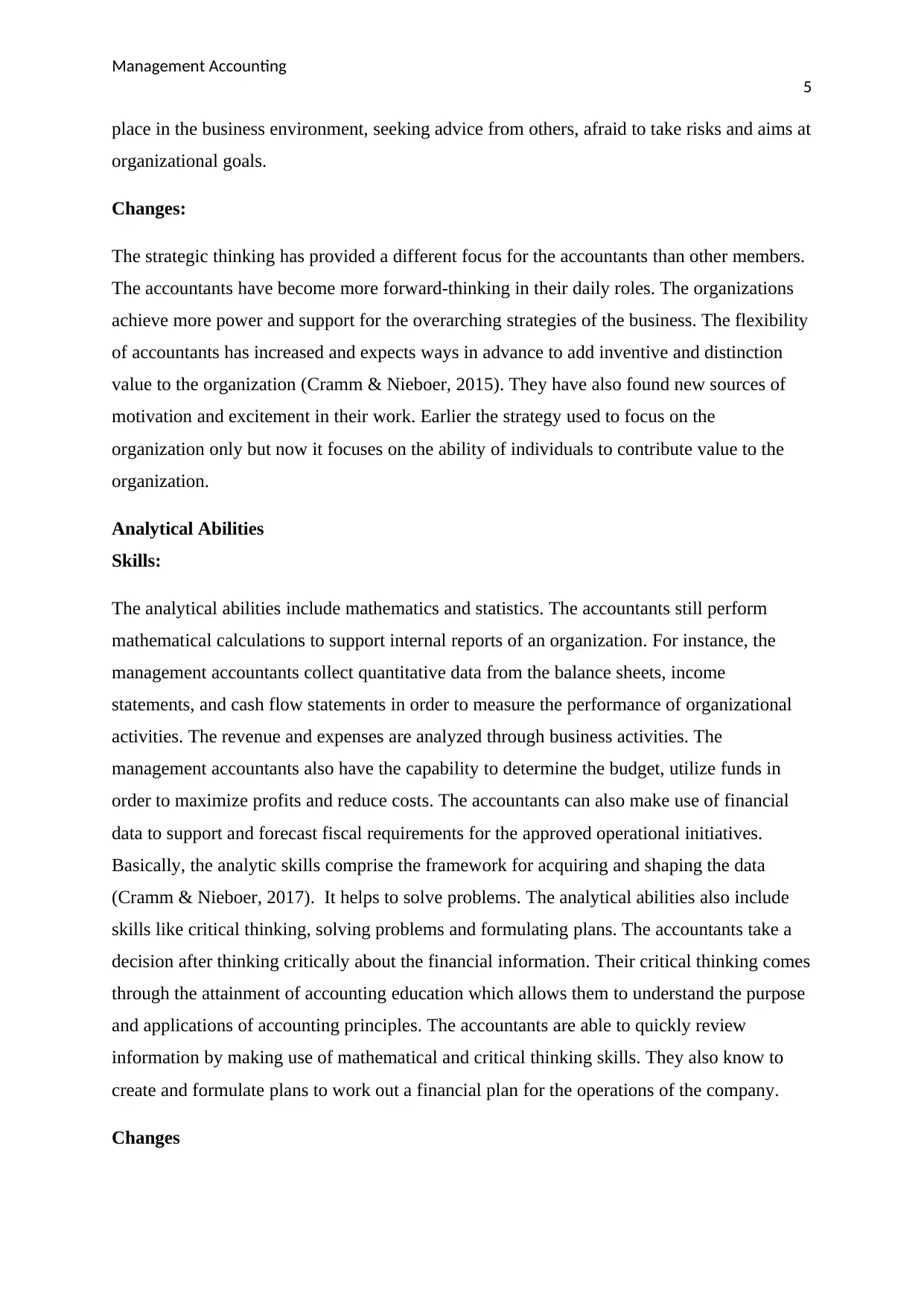
Management Accounting
5
place in the business environment, seeking advice from others, afraid to take risks and aims at
organizational goals.
Changes:
The strategic thinking has provided a different focus for the accountants than other members.
The accountants have become more forward-thinking in their daily roles. The organizations
achieve more power and support for the overarching strategies of the business. The flexibility
of accountants has increased and expects ways in advance to add inventive and distinction
value to the organization (Cramm & Nieboer, 2015). They have also found new sources of
motivation and excitement in their work. Earlier the strategy used to focus on the
organization only but now it focuses on the ability of individuals to contribute value to the
organization.
Analytical Abilities
Skills:
The analytical abilities include mathematics and statistics. The accountants still perform
mathematical calculations to support internal reports of an organization. For instance, the
management accountants collect quantitative data from the balance sheets, income
statements, and cash flow statements in order to measure the performance of organizational
activities. The revenue and expenses are analyzed through business activities. The
management accountants also have the capability to determine the budget, utilize funds in
order to maximize profits and reduce costs. The accountants can also make use of financial
data to support and forecast fiscal requirements for the approved operational initiatives.
Basically, the analytic skills comprise the framework for acquiring and shaping the data
(Cramm & Nieboer, 2017). It helps to solve problems. The analytical abilities also include
skills like critical thinking, solving problems and formulating plans. The accountants take a
decision after thinking critically about the financial information. Their critical thinking comes
through the attainment of accounting education which allows them to understand the purpose
and applications of accounting principles. The accountants are able to quickly review
information by making use of mathematical and critical thinking skills. They also know to
create and formulate plans to work out a financial plan for the operations of the company.
Changes
5
place in the business environment, seeking advice from others, afraid to take risks and aims at
organizational goals.
Changes:
The strategic thinking has provided a different focus for the accountants than other members.
The accountants have become more forward-thinking in their daily roles. The organizations
achieve more power and support for the overarching strategies of the business. The flexibility
of accountants has increased and expects ways in advance to add inventive and distinction
value to the organization (Cramm & Nieboer, 2015). They have also found new sources of
motivation and excitement in their work. Earlier the strategy used to focus on the
organization only but now it focuses on the ability of individuals to contribute value to the
organization.
Analytical Abilities
Skills:
The analytical abilities include mathematics and statistics. The accountants still perform
mathematical calculations to support internal reports of an organization. For instance, the
management accountants collect quantitative data from the balance sheets, income
statements, and cash flow statements in order to measure the performance of organizational
activities. The revenue and expenses are analyzed through business activities. The
management accountants also have the capability to determine the budget, utilize funds in
order to maximize profits and reduce costs. The accountants can also make use of financial
data to support and forecast fiscal requirements for the approved operational initiatives.
Basically, the analytic skills comprise the framework for acquiring and shaping the data
(Cramm & Nieboer, 2017). It helps to solve problems. The analytical abilities also include
skills like critical thinking, solving problems and formulating plans. The accountants take a
decision after thinking critically about the financial information. Their critical thinking comes
through the attainment of accounting education which allows them to understand the purpose
and applications of accounting principles. The accountants are able to quickly review
information by making use of mathematical and critical thinking skills. They also know to
create and formulate plans to work out a financial plan for the operations of the company.
Changes
⊘ This is a preview!⊘
Do you want full access?
Subscribe today to unlock all pages.

Trusted by 1+ million students worldwide
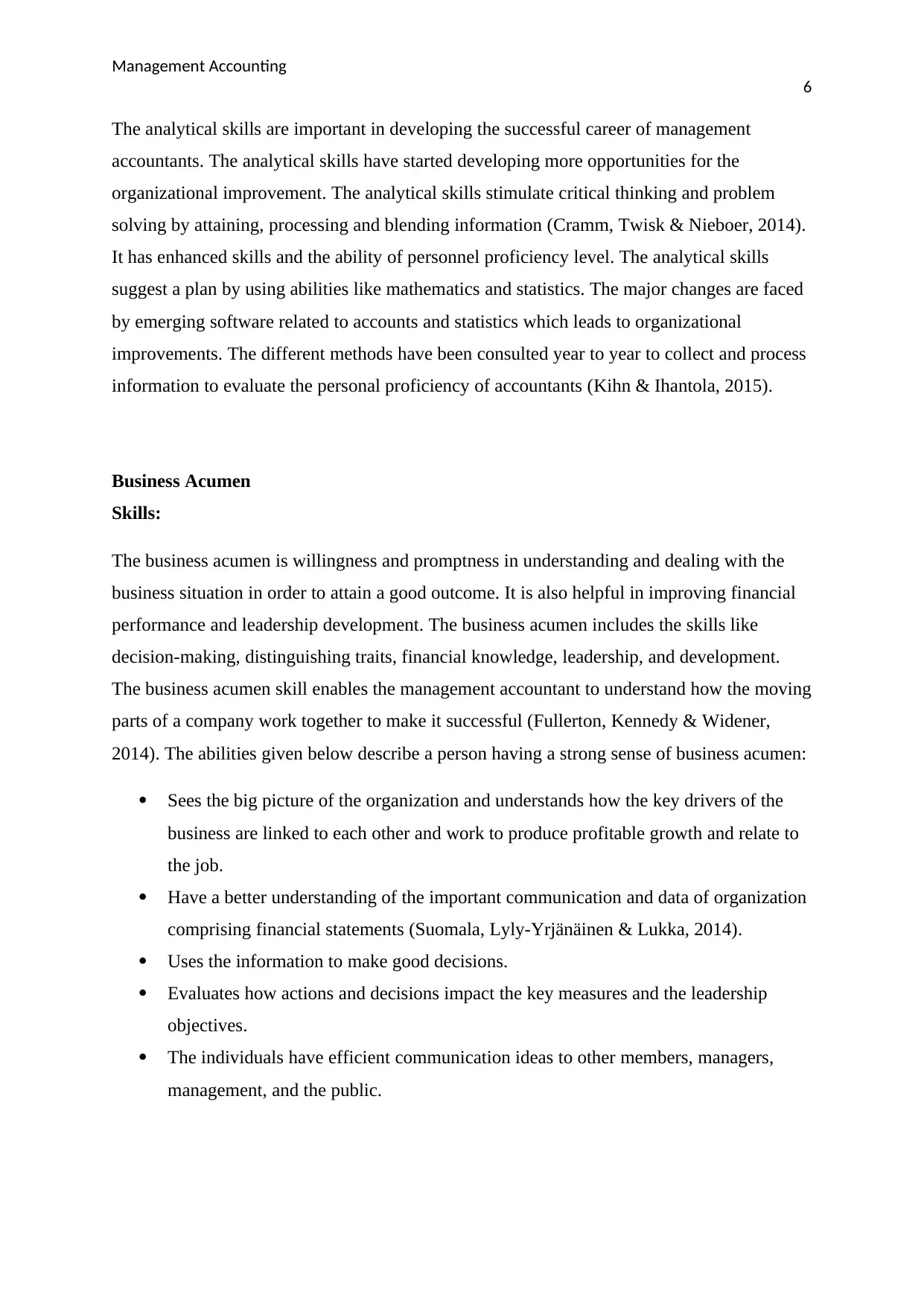
Management Accounting
6
The analytical skills are important in developing the successful career of management
accountants. The analytical skills have started developing more opportunities for the
organizational improvement. The analytical skills stimulate critical thinking and problem
solving by attaining, processing and blending information (Cramm, Twisk & Nieboer, 2014).
It has enhanced skills and the ability of personnel proficiency level. The analytical skills
suggest a plan by using abilities like mathematics and statistics. The major changes are faced
by emerging software related to accounts and statistics which leads to organizational
improvements. The different methods have been consulted year to year to collect and process
information to evaluate the personal proficiency of accountants (Kihn & Ihantola, 2015).
Business Acumen
Skills:
The business acumen is willingness and promptness in understanding and dealing with the
business situation in order to attain a good outcome. It is also helpful in improving financial
performance and leadership development. The business acumen includes the skills like
decision-making, distinguishing traits, financial knowledge, leadership, and development.
The business acumen skill enables the management accountant to understand how the moving
parts of a company work together to make it successful (Fullerton, Kennedy & Widener,
2014). The abilities given below describe a person having a strong sense of business acumen:
Sees the big picture of the organization and understands how the key drivers of the
business are linked to each other and work to produce profitable growth and relate to
the job.
Have a better understanding of the important communication and data of organization
comprising financial statements (Suomala, Lyly-Yrjänäinen & Lukka, 2014).
Uses the information to make good decisions.
Evaluates how actions and decisions impact the key measures and the leadership
objectives.
The individuals have efficient communication ideas to other members, managers,
management, and the public.
6
The analytical skills are important in developing the successful career of management
accountants. The analytical skills have started developing more opportunities for the
organizational improvement. The analytical skills stimulate critical thinking and problem
solving by attaining, processing and blending information (Cramm, Twisk & Nieboer, 2014).
It has enhanced skills and the ability of personnel proficiency level. The analytical skills
suggest a plan by using abilities like mathematics and statistics. The major changes are faced
by emerging software related to accounts and statistics which leads to organizational
improvements. The different methods have been consulted year to year to collect and process
information to evaluate the personal proficiency of accountants (Kihn & Ihantola, 2015).
Business Acumen
Skills:
The business acumen is willingness and promptness in understanding and dealing with the
business situation in order to attain a good outcome. It is also helpful in improving financial
performance and leadership development. The business acumen includes the skills like
decision-making, distinguishing traits, financial knowledge, leadership, and development.
The business acumen skill enables the management accountant to understand how the moving
parts of a company work together to make it successful (Fullerton, Kennedy & Widener,
2014). The abilities given below describe a person having a strong sense of business acumen:
Sees the big picture of the organization and understands how the key drivers of the
business are linked to each other and work to produce profitable growth and relate to
the job.
Have a better understanding of the important communication and data of organization
comprising financial statements (Suomala, Lyly-Yrjänäinen & Lukka, 2014).
Uses the information to make good decisions.
Evaluates how actions and decisions impact the key measures and the leadership
objectives.
The individuals have efficient communication ideas to other members, managers,
management, and the public.
Paraphrase This Document
Need a fresh take? Get an instant paraphrase of this document with our AI Paraphraser
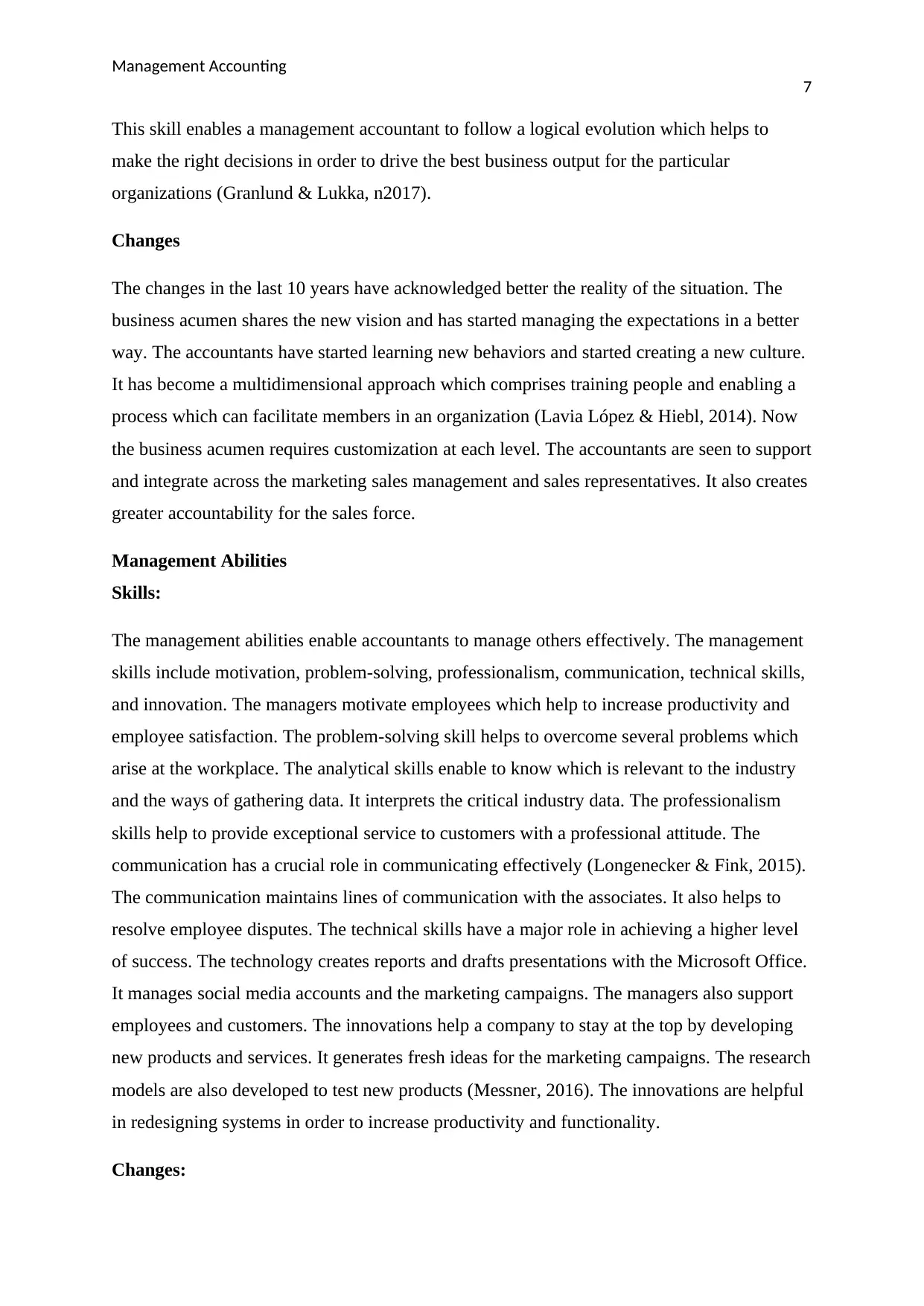
Management Accounting
7
This skill enables a management accountant to follow a logical evolution which helps to
make the right decisions in order to drive the best business output for the particular
organizations (Granlund & Lukka, n2017).
Changes
The changes in the last 10 years have acknowledged better the reality of the situation. The
business acumen shares the new vision and has started managing the expectations in a better
way. The accountants have started learning new behaviors and started creating a new culture.
It has become a multidimensional approach which comprises training people and enabling a
process which can facilitate members in an organization (Lavia López & Hiebl, 2014). Now
the business acumen requires customization at each level. The accountants are seen to support
and integrate across the marketing sales management and sales representatives. It also creates
greater accountability for the sales force.
Management Abilities
Skills:
The management abilities enable accountants to manage others effectively. The management
skills include motivation, problem-solving, professionalism, communication, technical skills,
and innovation. The managers motivate employees which help to increase productivity and
employee satisfaction. The problem-solving skill helps to overcome several problems which
arise at the workplace. The analytical skills enable to know which is relevant to the industry
and the ways of gathering data. It interprets the critical industry data. The professionalism
skills help to provide exceptional service to customers with a professional attitude. The
communication has a crucial role in communicating effectively (Longenecker & Fink, 2015).
The communication maintains lines of communication with the associates. It also helps to
resolve employee disputes. The technical skills have a major role in achieving a higher level
of success. The technology creates reports and drafts presentations with the Microsoft Office.
It manages social media accounts and the marketing campaigns. The managers also support
employees and customers. The innovations help a company to stay at the top by developing
new products and services. It generates fresh ideas for the marketing campaigns. The research
models are also developed to test new products (Messner, 2016). The innovations are helpful
in redesigning systems in order to increase productivity and functionality.
Changes:
7
This skill enables a management accountant to follow a logical evolution which helps to
make the right decisions in order to drive the best business output for the particular
organizations (Granlund & Lukka, n2017).
Changes
The changes in the last 10 years have acknowledged better the reality of the situation. The
business acumen shares the new vision and has started managing the expectations in a better
way. The accountants have started learning new behaviors and started creating a new culture.
It has become a multidimensional approach which comprises training people and enabling a
process which can facilitate members in an organization (Lavia López & Hiebl, 2014). Now
the business acumen requires customization at each level. The accountants are seen to support
and integrate across the marketing sales management and sales representatives. It also creates
greater accountability for the sales force.
Management Abilities
Skills:
The management abilities enable accountants to manage others effectively. The management
skills include motivation, problem-solving, professionalism, communication, technical skills,
and innovation. The managers motivate employees which help to increase productivity and
employee satisfaction. The problem-solving skill helps to overcome several problems which
arise at the workplace. The analytical skills enable to know which is relevant to the industry
and the ways of gathering data. It interprets the critical industry data. The professionalism
skills help to provide exceptional service to customers with a professional attitude. The
communication has a crucial role in communicating effectively (Longenecker & Fink, 2015).
The communication maintains lines of communication with the associates. It also helps to
resolve employee disputes. The technical skills have a major role in achieving a higher level
of success. The technology creates reports and drafts presentations with the Microsoft Office.
It manages social media accounts and the marketing campaigns. The managers also support
employees and customers. The innovations help a company to stay at the top by developing
new products and services. It generates fresh ideas for the marketing campaigns. The research
models are also developed to test new products (Messner, 2016). The innovations are helpful
in redesigning systems in order to increase productivity and functionality.
Changes:
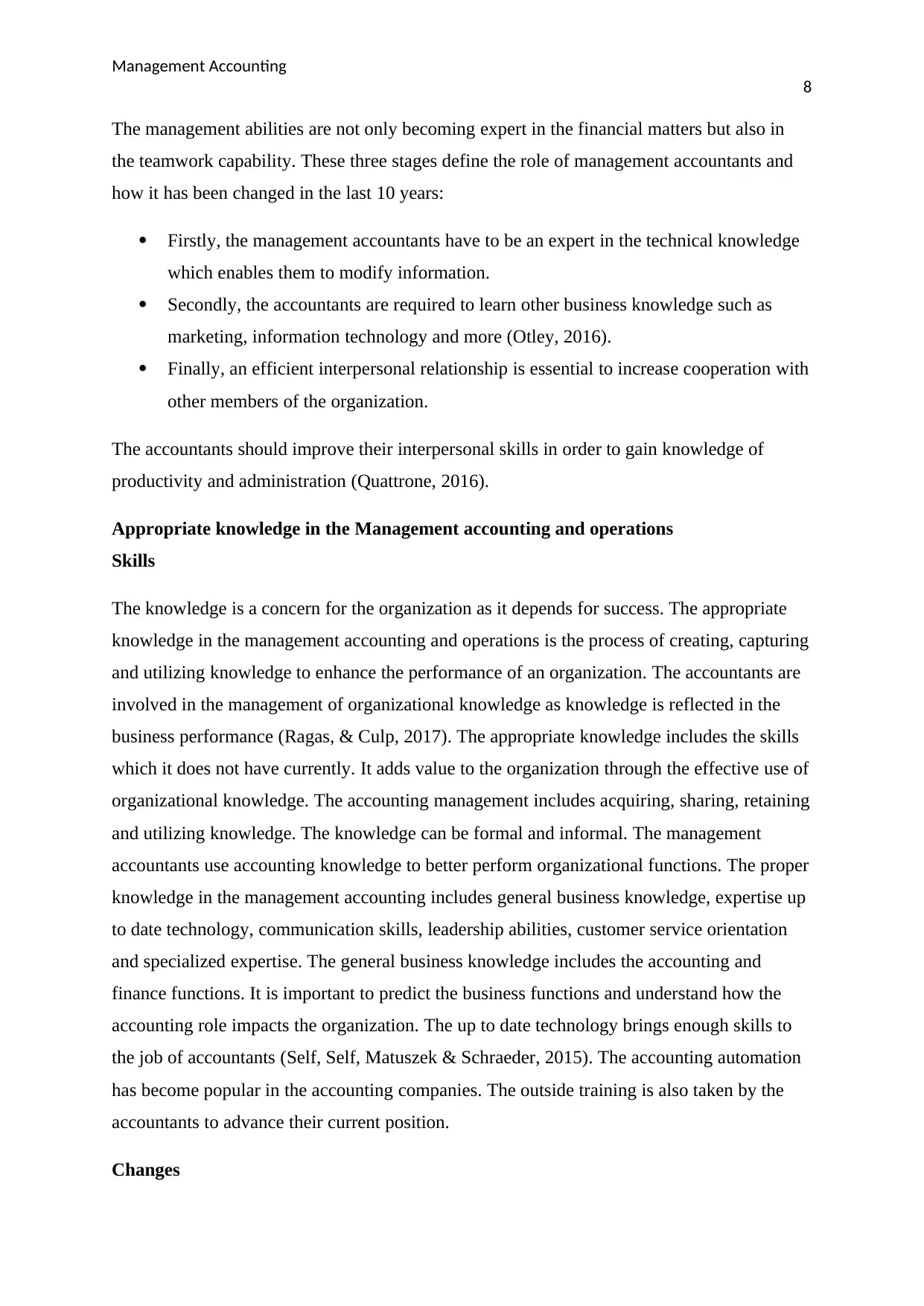
Management Accounting
8
The management abilities are not only becoming expert in the financial matters but also in
the teamwork capability. These three stages define the role of management accountants and
how it has been changed in the last 10 years:
Firstly, the management accountants have to be an expert in the technical knowledge
which enables them to modify information.
Secondly, the accountants are required to learn other business knowledge such as
marketing, information technology and more (Otley, 2016).
Finally, an efficient interpersonal relationship is essential to increase cooperation with
other members of the organization.
The accountants should improve their interpersonal skills in order to gain knowledge of
productivity and administration (Quattrone, 2016).
Appropriate knowledge in the Management accounting and operations
Skills
The knowledge is a concern for the organization as it depends for success. The appropriate
knowledge in the management accounting and operations is the process of creating, capturing
and utilizing knowledge to enhance the performance of an organization. The accountants are
involved in the management of organizational knowledge as knowledge is reflected in the
business performance (Ragas, & Culp, 2017). The appropriate knowledge includes the skills
which it does not have currently. It adds value to the organization through the effective use of
organizational knowledge. The accounting management includes acquiring, sharing, retaining
and utilizing knowledge. The knowledge can be formal and informal. The management
accountants use accounting knowledge to better perform organizational functions. The proper
knowledge in the management accounting includes general business knowledge, expertise up
to date technology, communication skills, leadership abilities, customer service orientation
and specialized expertise. The general business knowledge includes the accounting and
finance functions. It is important to predict the business functions and understand how the
accounting role impacts the organization. The up to date technology brings enough skills to
the job of accountants (Self, Self, Matuszek & Schraeder, 2015). The accounting automation
has become popular in the accounting companies. The outside training is also taken by the
accountants to advance their current position.
Changes
8
The management abilities are not only becoming expert in the financial matters but also in
the teamwork capability. These three stages define the role of management accountants and
how it has been changed in the last 10 years:
Firstly, the management accountants have to be an expert in the technical knowledge
which enables them to modify information.
Secondly, the accountants are required to learn other business knowledge such as
marketing, information technology and more (Otley, 2016).
Finally, an efficient interpersonal relationship is essential to increase cooperation with
other members of the organization.
The accountants should improve their interpersonal skills in order to gain knowledge of
productivity and administration (Quattrone, 2016).
Appropriate knowledge in the Management accounting and operations
Skills
The knowledge is a concern for the organization as it depends for success. The appropriate
knowledge in the management accounting and operations is the process of creating, capturing
and utilizing knowledge to enhance the performance of an organization. The accountants are
involved in the management of organizational knowledge as knowledge is reflected in the
business performance (Ragas, & Culp, 2017). The appropriate knowledge includes the skills
which it does not have currently. It adds value to the organization through the effective use of
organizational knowledge. The accounting management includes acquiring, sharing, retaining
and utilizing knowledge. The knowledge can be formal and informal. The management
accountants use accounting knowledge to better perform organizational functions. The proper
knowledge in the management accounting includes general business knowledge, expertise up
to date technology, communication skills, leadership abilities, customer service orientation
and specialized expertise. The general business knowledge includes the accounting and
finance functions. It is important to predict the business functions and understand how the
accounting role impacts the organization. The up to date technology brings enough skills to
the job of accountants (Self, Self, Matuszek & Schraeder, 2015). The accounting automation
has become popular in the accounting companies. The outside training is also taken by the
accountants to advance their current position.
Changes
⊘ This is a preview!⊘
Do you want full access?
Subscribe today to unlock all pages.

Trusted by 1+ million students worldwide
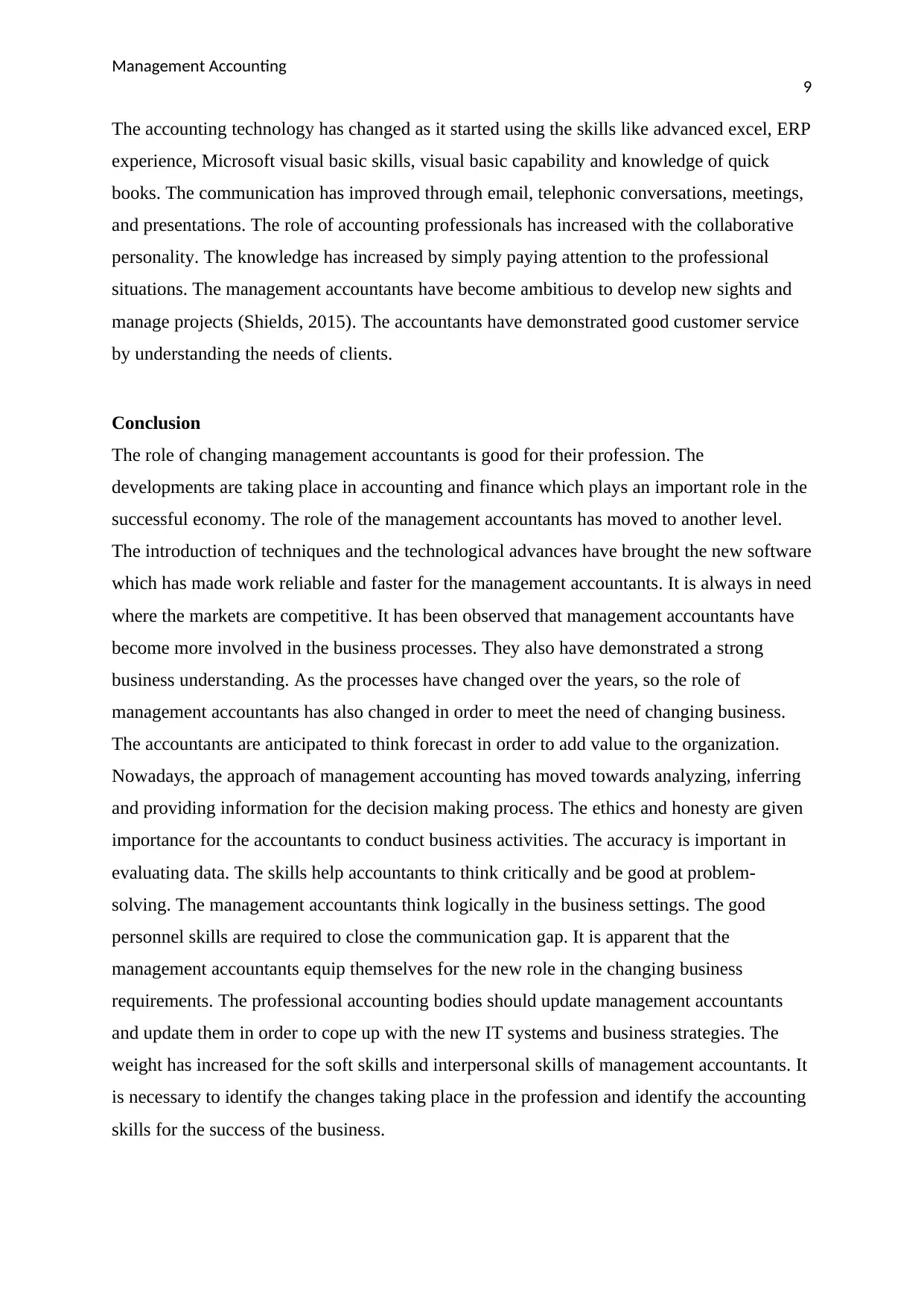
Management Accounting
9
The accounting technology has changed as it started using the skills like advanced excel, ERP
experience, Microsoft visual basic skills, visual basic capability and knowledge of quick
books. The communication has improved through email, telephonic conversations, meetings,
and presentations. The role of accounting professionals has increased with the collaborative
personality. The knowledge has increased by simply paying attention to the professional
situations. The management accountants have become ambitious to develop new sights and
manage projects (Shields, 2015). The accountants have demonstrated good customer service
by understanding the needs of clients.
Conclusion
The role of changing management accountants is good for their profession. The
developments are taking place in accounting and finance which plays an important role in the
successful economy. The role of the management accountants has moved to another level.
The introduction of techniques and the technological advances have brought the new software
which has made work reliable and faster for the management accountants. It is always in need
where the markets are competitive. It has been observed that management accountants have
become more involved in the business processes. They also have demonstrated a strong
business understanding. As the processes have changed over the years, so the role of
management accountants has also changed in order to meet the need of changing business.
The accountants are anticipated to think forecast in order to add value to the organization.
Nowadays, the approach of management accounting has moved towards analyzing, inferring
and providing information for the decision making process. The ethics and honesty are given
importance for the accountants to conduct business activities. The accuracy is important in
evaluating data. The skills help accountants to think critically and be good at problem-
solving. The management accountants think logically in the business settings. The good
personnel skills are required to close the communication gap. It is apparent that the
management accountants equip themselves for the new role in the changing business
requirements. The professional accounting bodies should update management accountants
and update them in order to cope up with the new IT systems and business strategies. The
weight has increased for the soft skills and interpersonal skills of management accountants. It
is necessary to identify the changes taking place in the profession and identify the accounting
skills for the success of the business.
9
The accounting technology has changed as it started using the skills like advanced excel, ERP
experience, Microsoft visual basic skills, visual basic capability and knowledge of quick
books. The communication has improved through email, telephonic conversations, meetings,
and presentations. The role of accounting professionals has increased with the collaborative
personality. The knowledge has increased by simply paying attention to the professional
situations. The management accountants have become ambitious to develop new sights and
manage projects (Shields, 2015). The accountants have demonstrated good customer service
by understanding the needs of clients.
Conclusion
The role of changing management accountants is good for their profession. The
developments are taking place in accounting and finance which plays an important role in the
successful economy. The role of the management accountants has moved to another level.
The introduction of techniques and the technological advances have brought the new software
which has made work reliable and faster for the management accountants. It is always in need
where the markets are competitive. It has been observed that management accountants have
become more involved in the business processes. They also have demonstrated a strong
business understanding. As the processes have changed over the years, so the role of
management accountants has also changed in order to meet the need of changing business.
The accountants are anticipated to think forecast in order to add value to the organization.
Nowadays, the approach of management accounting has moved towards analyzing, inferring
and providing information for the decision making process. The ethics and honesty are given
importance for the accountants to conduct business activities. The accuracy is important in
evaluating data. The skills help accountants to think critically and be good at problem-
solving. The management accountants think logically in the business settings. The good
personnel skills are required to close the communication gap. It is apparent that the
management accountants equip themselves for the new role in the changing business
requirements. The professional accounting bodies should update management accountants
and update them in order to cope up with the new IT systems and business strategies. The
weight has increased for the soft skills and interpersonal skills of management accountants. It
is necessary to identify the changes taking place in the profession and identify the accounting
skills for the success of the business.
Paraphrase This Document
Need a fresh take? Get an instant paraphrase of this document with our AI Paraphraser
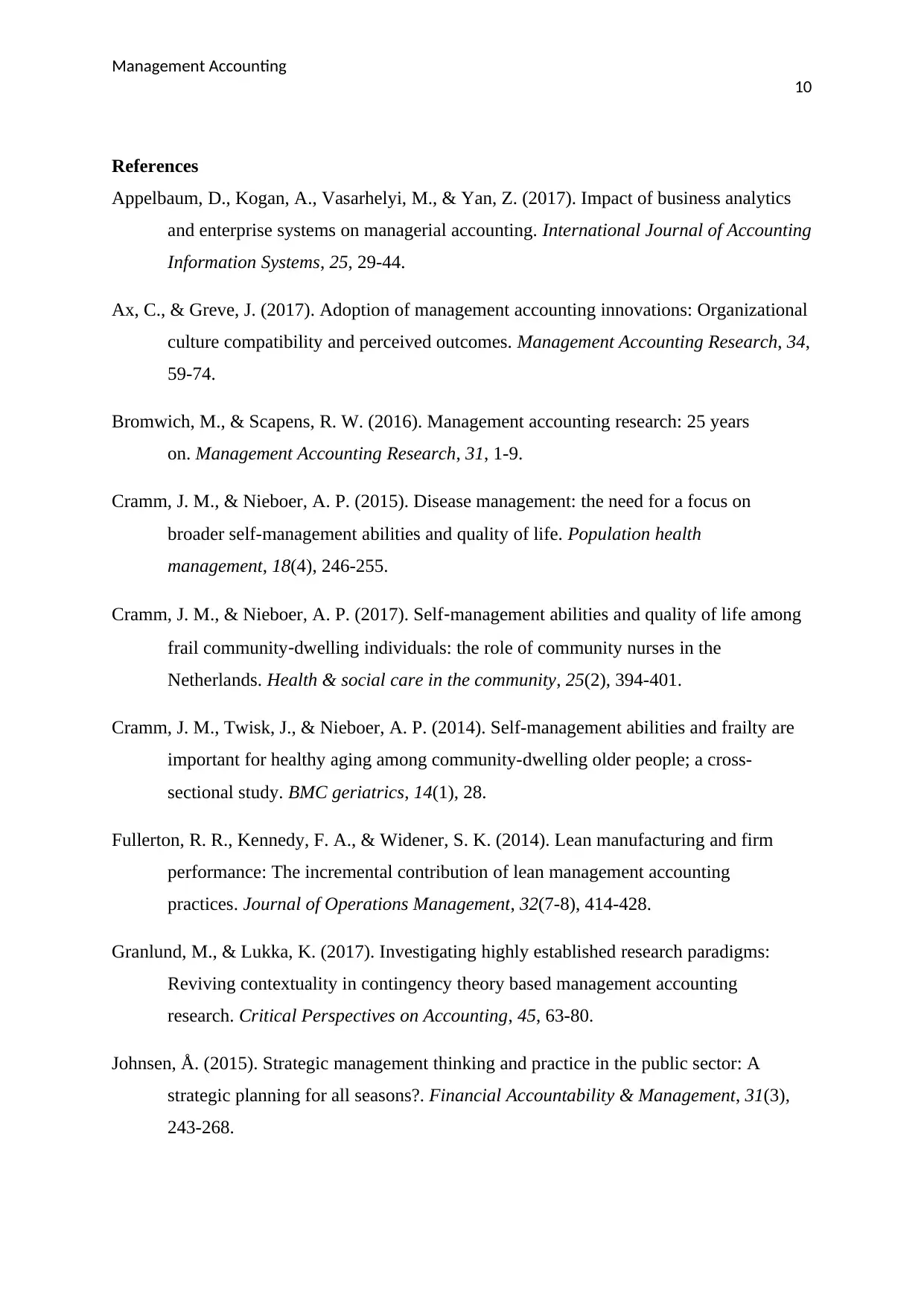
Management Accounting
10
References
Appelbaum, D., Kogan, A., Vasarhelyi, M., & Yan, Z. (2017). Impact of business analytics
and enterprise systems on managerial accounting. International Journal of Accounting
Information Systems, 25, 29-44.
Ax, C., & Greve, J. (2017). Adoption of management accounting innovations: Organizational
culture compatibility and perceived outcomes. Management Accounting Research, 34,
59-74.
Bromwich, M., & Scapens, R. W. (2016). Management accounting research: 25 years
on. Management Accounting Research, 31, 1-9.
Cramm, J. M., & Nieboer, A. P. (2015). Disease management: the need for a focus on
broader self-management abilities and quality of life. Population health
management, 18(4), 246-255.
Cramm, J. M., & Nieboer, A. P. (2017). Self‐management abilities and quality of life among
frail community‐dwelling individuals: the role of community nurses in the
Netherlands. Health & social care in the community, 25(2), 394-401.
Cramm, J. M., Twisk, J., & Nieboer, A. P. (2014). Self-management abilities and frailty are
important for healthy aging among community-dwelling older people; a cross-
sectional study. BMC geriatrics, 14(1), 28.
Fullerton, R. R., Kennedy, F. A., & Widener, S. K. (2014). Lean manufacturing and firm
performance: The incremental contribution of lean management accounting
practices. Journal of Operations Management, 32(7-8), 414-428.
Granlund, M., & Lukka, K. (2017). Investigating highly established research paradigms:
Reviving contextuality in contingency theory based management accounting
research. Critical Perspectives on Accounting, 45, 63-80.
Johnsen, Å. (2015). Strategic management thinking and practice in the public sector: A
strategic planning for all seasons?. Financial Accountability & Management, 31(3),
243-268.
10
References
Appelbaum, D., Kogan, A., Vasarhelyi, M., & Yan, Z. (2017). Impact of business analytics
and enterprise systems on managerial accounting. International Journal of Accounting
Information Systems, 25, 29-44.
Ax, C., & Greve, J. (2017). Adoption of management accounting innovations: Organizational
culture compatibility and perceived outcomes. Management Accounting Research, 34,
59-74.
Bromwich, M., & Scapens, R. W. (2016). Management accounting research: 25 years
on. Management Accounting Research, 31, 1-9.
Cramm, J. M., & Nieboer, A. P. (2015). Disease management: the need for a focus on
broader self-management abilities and quality of life. Population health
management, 18(4), 246-255.
Cramm, J. M., & Nieboer, A. P. (2017). Self‐management abilities and quality of life among
frail community‐dwelling individuals: the role of community nurses in the
Netherlands. Health & social care in the community, 25(2), 394-401.
Cramm, J. M., Twisk, J., & Nieboer, A. P. (2014). Self-management abilities and frailty are
important for healthy aging among community-dwelling older people; a cross-
sectional study. BMC geriatrics, 14(1), 28.
Fullerton, R. R., Kennedy, F. A., & Widener, S. K. (2014). Lean manufacturing and firm
performance: The incremental contribution of lean management accounting
practices. Journal of Operations Management, 32(7-8), 414-428.
Granlund, M., & Lukka, K. (2017). Investigating highly established research paradigms:
Reviving contextuality in contingency theory based management accounting
research. Critical Perspectives on Accounting, 45, 63-80.
Johnsen, Å. (2015). Strategic management thinking and practice in the public sector: A
strategic planning for all seasons?. Financial Accountability & Management, 31(3),
243-268.
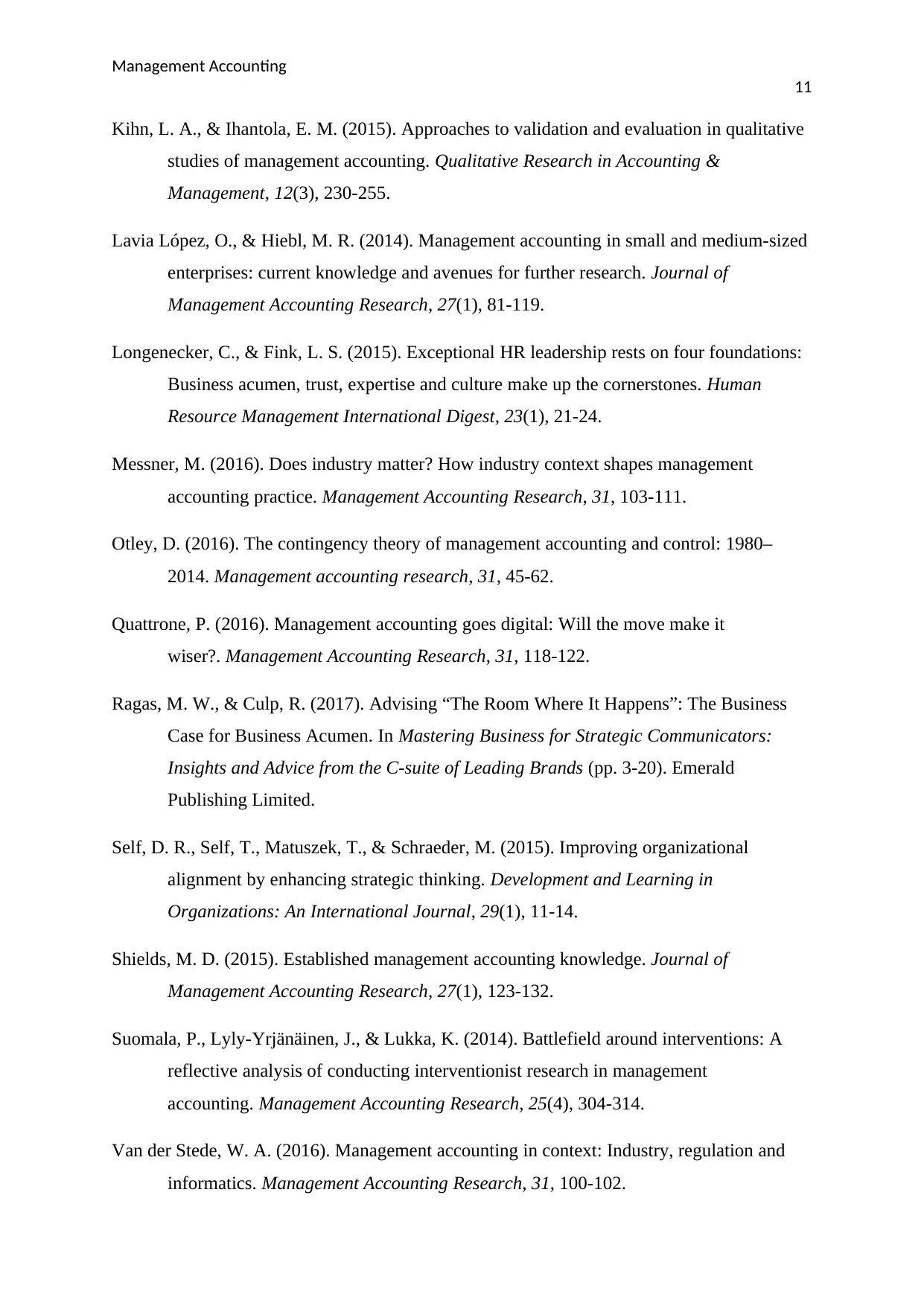
Management Accounting
11
Kihn, L. A., & Ihantola, E. M. (2015). Approaches to validation and evaluation in qualitative
studies of management accounting. Qualitative Research in Accounting &
Management, 12(3), 230-255.
Lavia López, O., & Hiebl, M. R. (2014). Management accounting in small and medium-sized
enterprises: current knowledge and avenues for further research. Journal of
Management Accounting Research, 27(1), 81-119.
Longenecker, C., & Fink, L. S. (2015). Exceptional HR leadership rests on four foundations:
Business acumen, trust, expertise and culture make up the cornerstones. Human
Resource Management International Digest, 23(1), 21-24.
Messner, M. (2016). Does industry matter? How industry context shapes management
accounting practice. Management Accounting Research, 31, 103-111.
Otley, D. (2016). The contingency theory of management accounting and control: 1980–
2014. Management accounting research, 31, 45-62.
Quattrone, P. (2016). Management accounting goes digital: Will the move make it
wiser?. Management Accounting Research, 31, 118-122.
Ragas, M. W., & Culp, R. (2017). Advising “The Room Where It Happens”: The Business
Case for Business Acumen. In Mastering Business for Strategic Communicators:
Insights and Advice from the C-suite of Leading Brands (pp. 3-20). Emerald
Publishing Limited.
Self, D. R., Self, T., Matuszek, T., & Schraeder, M. (2015). Improving organizational
alignment by enhancing strategic thinking. Development and Learning in
Organizations: An International Journal, 29(1), 11-14.
Shields, M. D. (2015). Established management accounting knowledge. Journal of
Management Accounting Research, 27(1), 123-132.
Suomala, P., Lyly-Yrjänäinen, J., & Lukka, K. (2014). Battlefield around interventions: A
reflective analysis of conducting interventionist research in management
accounting. Management Accounting Research, 25(4), 304-314.
Van der Stede, W. A. (2016). Management accounting in context: Industry, regulation and
informatics. Management Accounting Research, 31, 100-102.
11
Kihn, L. A., & Ihantola, E. M. (2015). Approaches to validation and evaluation in qualitative
studies of management accounting. Qualitative Research in Accounting &
Management, 12(3), 230-255.
Lavia López, O., & Hiebl, M. R. (2014). Management accounting in small and medium-sized
enterprises: current knowledge and avenues for further research. Journal of
Management Accounting Research, 27(1), 81-119.
Longenecker, C., & Fink, L. S. (2015). Exceptional HR leadership rests on four foundations:
Business acumen, trust, expertise and culture make up the cornerstones. Human
Resource Management International Digest, 23(1), 21-24.
Messner, M. (2016). Does industry matter? How industry context shapes management
accounting practice. Management Accounting Research, 31, 103-111.
Otley, D. (2016). The contingency theory of management accounting and control: 1980–
2014. Management accounting research, 31, 45-62.
Quattrone, P. (2016). Management accounting goes digital: Will the move make it
wiser?. Management Accounting Research, 31, 118-122.
Ragas, M. W., & Culp, R. (2017). Advising “The Room Where It Happens”: The Business
Case for Business Acumen. In Mastering Business for Strategic Communicators:
Insights and Advice from the C-suite of Leading Brands (pp. 3-20). Emerald
Publishing Limited.
Self, D. R., Self, T., Matuszek, T., & Schraeder, M. (2015). Improving organizational
alignment by enhancing strategic thinking. Development and Learning in
Organizations: An International Journal, 29(1), 11-14.
Shields, M. D. (2015). Established management accounting knowledge. Journal of
Management Accounting Research, 27(1), 123-132.
Suomala, P., Lyly-Yrjänäinen, J., & Lukka, K. (2014). Battlefield around interventions: A
reflective analysis of conducting interventionist research in management
accounting. Management Accounting Research, 25(4), 304-314.
Van der Stede, W. A. (2016). Management accounting in context: Industry, regulation and
informatics. Management Accounting Research, 31, 100-102.
⊘ This is a preview!⊘
Do you want full access?
Subscribe today to unlock all pages.

Trusted by 1+ million students worldwide
1 out of 13
Related Documents
Your All-in-One AI-Powered Toolkit for Academic Success.
+13062052269
info@desklib.com
Available 24*7 on WhatsApp / Email
![[object Object]](/_next/static/media/star-bottom.7253800d.svg)
Unlock your academic potential
Copyright © 2020–2025 A2Z Services. All Rights Reserved. Developed and managed by ZUCOL.




